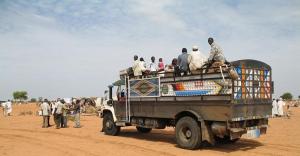I like to think of myself as old-school. I didn't do a fancy journalism course but worked my up through local weekly papers to the regionals and then the nationals. Journalism to me is just about asking questions and writing down the answers. Sure, along the way I did a shorthand course and picked up enough law to get by but the rest isn't rocket science. I learned as I went along. I made mistakes. With luck I made them once, and remembered enough not to do it again.
That's fine until you are sitting in an aid camp interviewing a woman who has been raped. How do you raise the subject? Should you name her? What's informed consent? Is she a victim or a survivor? I probably stumbled my way through several awkward interviews until I began to learn how to handle things sensitively. Not ideal. I could still learn more.
Nick Kristof of The New York Times is learning the hard way too. In a recent column he named a nine-year-old rape victim he met in the Democratic Republic of Congo. The result was a wave of criticism, questioning what sort of criterion were used to justify naming her. Now Kristof has written a blog post discussing the question, but ultimately justifying his decision
I identified the Congo rape victims by name because I had permission and because I was completely confident that they wouldn’t get in trouble, and because I think that’s the only way to raise the issue on the agenda and stop this kind of sexual predation.
He rightly argues that aid agencies often go too far in trying to protect people who don't want to be protected. But it is difficult to make that point for a 9-year-old. He also shows his lack of understanding of Africa by suggesting that many people share the same name, making it difficult to trace individuals in his stories from, say, Darfur. Ridiculous. There may be many people with the same name, but simply asking to find the girl who spoke to the white man last week would probably narrow the field. But his biggest failure was not to follow the policy of The New York Times, in raising the matter with a senior editor...
That’s a policy that makes sense to me; I didn’t consult but should have (and will in the future).
This suggests he acted without thinking and his justification came all rather after the fact.
Anyway, these are difficult areas for journalists.
But there are organisations that aim to make a difference. The Dart Centre for Journalism and Trauma tries to equip reporters with the skills they need to cover violence - whether interviewing victims of rape, covering natural disasters or spotting the symptoms of post-traumatic stress disorder. This is something I was never trained to do. And we can all learn a bit more. And for this reason, five per cent of the proceeds from my book Saving Darfur: Everyone's Favourite African War will be donated to The Dart Centre Europe.


What do you think?